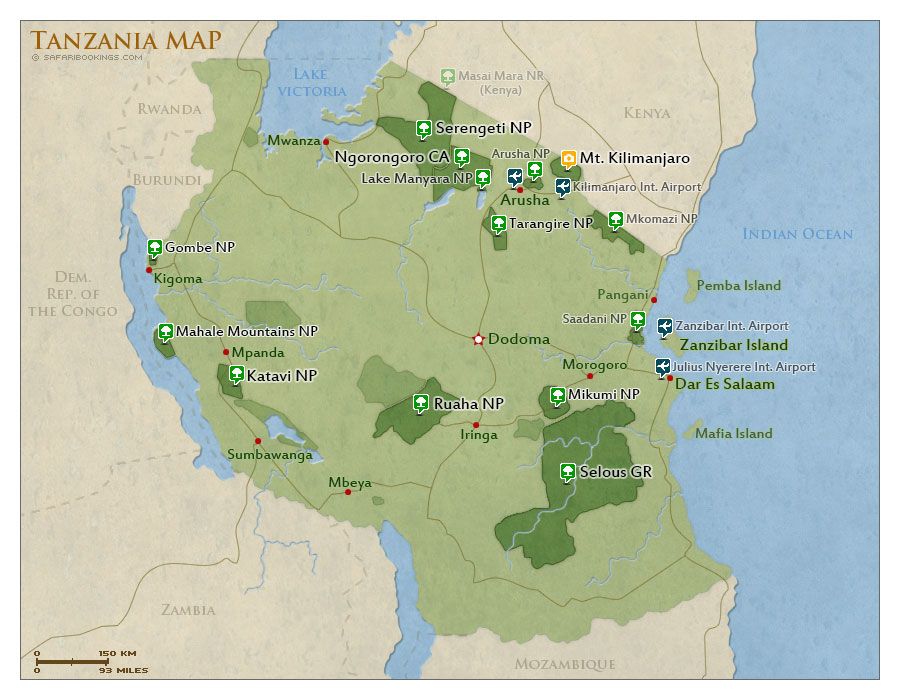- About
- SAFARIS
- Climbing
- Zanzibar
- Destinations
- Travel Bureau
Tanzania, a stunning country in Eastern Africa, is renowned for its diverse landscapes, rich culture, and abundant wildlife. With its borders touching Kenya and Uganda to the north, and Zambia, Malawi, and Mozambique to the south, Tanzania presents a unique blend of experiences for travelers. Whether you’re hiking Mount Kilimanjaro, exploring the Serengeti, or relaxing on the shores of Zanzibar, understanding the essential travel tips and plans to Tanzania will enhance your experience and ensure a memorable journey.

When planning your trip, safety and security are paramount. Generally, Tanzania is a safe country to visit. With nearly a million tourists arriving annually, the majority of visits are hassle-free. However, travelers should always remain aware of their surroundings and maintain a clear purpose for their visit. The key to a secure trip lies in understanding the local customs, respecting the environment, and being cautious, especially in crowded areas.
It is wise to avoid walking alone at night, especially in unfamiliar areas. Opt for trusted transportation options and stay in reputable accommodations. Also, consider purchasing travel insurance to cover unexpected events during your trip.
For your travel plans to Tanzania, obtaining a visa is an essential step. Travelers can acquire a visa either in advance from Tanzanian embassies or high commissions or upon arrival at any entry point. Many airlines require proof of a visa before departure, so it is advisable to check their policies. You can read more on Tanzania Electronic Visa Application System
This option simplifies the process, allowing you to secure your travel documentation ahead of time. Ensure that your passport is valid for at least six months beyond your arrival date, as this is a common requirement for many travelers.
Health is a critical aspect of travel planning. If you are traveling from or thro
ugh a country with a high risk of yellow fever, it is necessary to get vaccinated before your journey. The yellow fever vaccine is a requirement for entry into Tanzania. Consult with your healthcare provider or travel clinic for more information on necessary vaccinations and health precautions.
In addition to yellow fever, consider vaccines for hepatitis A, hepatitis B, and typhoid, as these can provide additional protection during your stay. Always carry any medications you may need and have a plan for accessing medical care if necessary.
Tipping is customary in Tanzania, and it’s an important aspect of showing appreciation for good service. For example, if you’re climbing Mount Kilimanjaro, a recommended tip is between 100 and 150 USD per climber for the crew members who support you. Generally, a tip of 15 to 25 USD per day for guides is common, though this is optional and can vary based on the quality of service received.
When dining in restaurants, rounding up the bill or leaving a 10% tip is
appreciated. Always check if a service charge is already included in the bill to avoid double tipping.
Tanzania’s national language is Kiswahili, which is widely spoken across the country. While English is also commonly understood, particularly in tourist areas, knowing a few basic Kiswahili phrases can enhance your interactions with locals. Learning simple greetings and expressions will not only enrich your experience but also show respect for the local culture.
With over 120 tribes, Tanzania is a melting pot of traditions and customs. Each tribe contributes to the country’s vibrant cultural landscape, making it a fascinating destination for travelers interested in learning about diverse ways of life.
Financial preparation is vital when planning your trip. Once your travel plans to Tanzania are confirmed, a deposit of at least 30% will typically be required to secure hotel bookings and other reservations. This can be conveniently done through a telegraphic transfer or via an online payment system.
The remaining balance can be settled a month before arrival or upon arrival by cash or credit card. If you choose to pay by credit card, be aware that additional bank charges (typically around 4.5%) may apply. It’s advisable to carry some cash for small purchases, as not all establishments accept cards.
Tanzania operates on a single time zone, which is GMT+3. This consistency simplifies travel planning and helps you adjust your itinerary accordingly. Be mindful of the time difference w
hen communicating with friends or family back home, especially if you are in different time zones.
Before traveling, it’s essential to understand the electrical standards in Tanzania. The country primarily uses type D and G power sockets, with type G being the most common. The standard voltage is 230 V, and the frequency is 50 Hz. Consider bringing a universal travel adapter to ensure your electronic devices can be charged without issue.

For those interested in giving back during their travels, Tanzania offers numerous volunteering opportunities. Joagro Safari Tanzania collaborates with various non-governmental organizations (NGOs) focused on different thematic areas, including sports for development, environmental conservation, women’s and youth programs, education, culture, and entrepreneurship. Depending on your stay, you can engage in meaningful projects that contribute to local communities and ecosystems.
As you travel, it’s crucial to practice environmental responsibility. Avoid the use of disposable plastics, which can harm the delicate ecosystems in Tanzania. Ensure you do not litter, regardless of how small the item may seem, and refrain from carrying away fossil remains from national parks. Respecting nature not only helps preserve Tanzania’s beauty but also fosters a sense of shared responsibility among travelers and locals.
Understanding and respecting local customs is key to a successful trip. Dress modestly, particularly in rural areas and when visiting religious sites. It’s advisable for women to cover their shoulders and knees, while men should avoid wearing shorts in such locations.
Engage with locals respectfully, and be open to learning about their traditions and practices. Participating in local festivals or community events can offer deeper insights into Tanzanian culture and strengthen your connection with the people.
Tanzania is home to some of the most stunning natural landscapes and wildlife. When exploring national parks or reserves, it’s vital to prioritize safety. Always follow the guidelines provided by park rangers and tour guides.
Keep a safe distance from wild animals, and never attempt to feed or provoke them. If you’re going on a safari, traveling with an experienced guide will enhance your understanding of the ecosystem and ensure a safe and enjoyable experience.
Tanzania is famous for its incredible national parks, each offering unique experiences. The Serengeti National Park, known for the Great Migration, provides opportunities to witness wildlife in their natural habitat. Ngorongoro Crater, a UNESCO World Heritage site, is another must-visit destination, renowned for its stunning landscapes and diverse wildlife.
To make the most of your visit to these parks, plan your itinerary carefully. Many visitors choose to explore multiple parks to experience the variety of flora and fauna. Research the best times to visit each park, as wildlife activity can vary with the seasons.
In addition to safaris, Tanzania offers a range of adventure activities for the intrepid traveler. Hiking Mount Kilimanjaro, Africa’s highest peak, is a popular challenge for many. Various routes cater to different skill levels, so choose one that suits your experience and physical condition.
Water-based activities are also plentiful, especially in coastal areas. Snorkeling, scuba diving, and deep-sea fishing are just a few options available for those looking to explore the stunning underwater world surrounding the islands of Zanzibar and Pemba.
Exploring local cuisine is an integral part of any travel experience. Tanzanian food reflects the diverse cultures within the country. Staples such as ugali (a type of maize porridge), rice dishes, and grilled meats are commonly found in local restaurants. Don’t miss the chance to sample street food, which offers a taste of authentic flavors.
Zanzibar, in particular, is famous for its spices, earning it the nickname “Spice Island.” Take a spice tour to learn about the cultivation and uses of various spices, and enjoy the delicious dishes prepared with these fresh ingredients.
As a visitor to Tanzania, you can play a role in supporting wildlife conservation efforts. Many organizations focus on protecting endangered species and their habitats. Consider visiting conservation projects or contributing to wildlife reserves, which rely on tourism revenue to sustain their efforts.
Be mindful of the impact of tourism on wildlife and ecosystems
. Choose responsible tour operators that prioritize ethical practices and support conservation initiatives.
Before you travel, investing in travel insurance is a wise decision. Insurance can cover unexpected events such as trip cancellations, medical emergencies, and lost belongings. Ensure your policy includes coverage for outdoor activities, as some standard policies may exclude adventure sports.
Navigating Tanzania can vary significantly depending on where you are. In urban areas like Dar es Salaam, taxis and ride-sharing services are widely available. For long distances between cities, consider using domestic flights, as road conditions can sometimes be challenging.
In rural areas, public transportation options such as buses or shared taxis are available. Be prepared for longer travel times, as roads may be less developed. Renting a vehicle with a driver is also a popular option for those who prefer a more personalized experience.
In summary, planning your travel to Tanzania requires careful consideration of various factors to ensure a safe and enjoyable experience. By following the travel tips and plans to Tanzania outlined in this guide, you will be well-equipped to navigate the unique challenges and opportunities that this remarkable country offers.
From understanding visa requirements to engaging with local cultures, being informed will enhance your journey. Immerse yourself in the breathtaking landscapes, vibrant wildlife, and warm hospitality of Tanzania, and cherish the memories created during your travels.
As you prepare for your adventure, keep in mind the importance of respecting the environment and supporting local communities. By doing so, you will contribute to the preservation of Tanzania’s natural beauty and cultural heritage for future generations to enjoy.
For easy and solid Travel tips and plans to Tanzania you can read other related requirements that we have prepared like Yellow Fever Vaccination because hassle-free and safety is our priority
